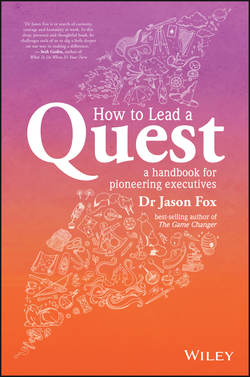Читать книгу How To Lead A Quest - Fox Jason - Страница 11
На сайте Литреса книга снята с продажи.
Part I
Default Thinking and the Kraken of Doom
1
The Anatomy of Default Thinking
NORMS
Оглавление‘Erm, that's just not the done thing around here.'
Norms are cultural products (including values, customs and rituals) that represent our understanding of what others do, and what others think that we should do. Norms occur in many contexts, not only at the team level, the organisation level and the industry level, but also across countries, age demographics, cities, suburbs, and so on. For example, I'm writing this book at a cafe in Fitzroy, an inner-city suburb in Melbourne that, according to a 2015 article published in London's Telegraph, ranks in the top three of the most hipster neighbourhoods in the world. As such, good coffee, ironic tattoos, beards, skateboards, pop-up stores, ripped skinny jeans, thick-rimmed glasses, craft beer (and so on) all contribute to the norms of this area. I get no comments on my flaming red beard or coffee snobbery in Fitzroy – but very much do when I travel abroad.
Norms influence our defaults. When at a loss as to what to do, our brain will scan for a default. If we identify a pattern we haven't experienced yet, one of the reference points that will influence our decision on how to behave is the established norms. ‘What would others do? What would they think I should do?' The answer to these types of questions is usually something that's predictable and safe.11
As a leader, understanding the values that influence your behaviour, the values that drive your colleagues' behaviours, and the company values12 that influence the collective behaviour of your organisation is really important.
Norms are powerful. They are frequently repeated and reinforced by the people who surround you. Deviance from the established norms is often frowned upon, and viewed with mistrust. If one strays too far from the established norms, one may be cast as a pariah or deviant.13 This is unfortunate, because most norms are established in precedence (the past), and are self-validating and reinforcing.
11
Remember – default thinking favours the minimisation of angst in return for the greatest short-term gain.
12
I'm not talking here about understanding the standard mix of integrity, innovation, collaboration, safety, diversity, community, and other ‘default' values. Unless, of course, you've actually done the work of translating what these values mean in terms of keystone behaviours.
13
Which is why the hero's journey is so challenging, and why it's incredibly important that leaders invest in culture change to ensure the folk they work with are part of the journey too – it's a lonely journey, otherwise. Pioneering strategy requires pioneering leadership, but it also requires a cultural norm that supports it – even if it's a bimodal culture to begin with (see chapter 16).
